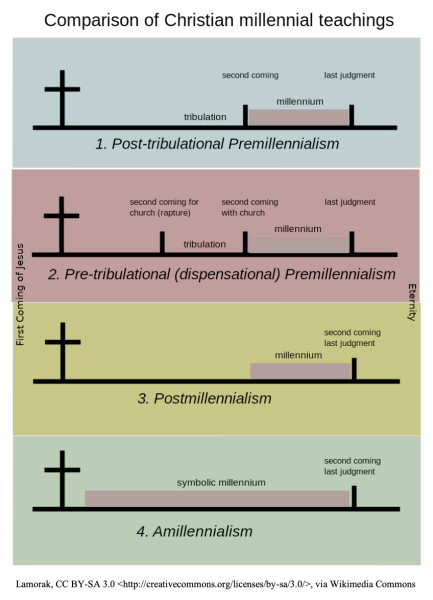A Thousand Years
By Ps Dev Menon
In Revelation 20:1-6, the phrase “a thousand years” is mentioned six times. This phrase is rather unique in Scripture, with only a couple of other brief uses in Psalm 90:4 & 2 Peter 3:8.
Clearly it refers to a prolonged period of time where Satan is restrained and the saints reign with Christ before final judgment and the new creation. But when and how exactly does that happen? That has been the focus of intense debate for close to 3000 years (yes you read that right)!
Even before Revelation was written, many Jewish scholars believed in a golden age; where with the coming of the Messiah, the law of Moses would extend beyond Jerusalem to the ends of the earth – quoting passages like Isaiah 11, 65 and Psalm 72.
Some early church fathers, like Justin and Tertullian, took a similar view. Just like God worked 6 days and rested the 7th; so at the end of 6000 years Christ would come and physically reign with all His saints, raised from the dead, for 1000 years, in an Edenic age – before the new creation.
However, there were those like Augustine, who insisted that the language of Rev 20 (and those OT passages) was symbolic, describing the present time. A sort of “church age”, where right now the saints are raised and reigning with Christ spiritually for a symbolic 1000 years. After which, Christ will return in judgment.
Still others like Eusebius, agreed that the thousand years was symbolic, but with one major difference. They saw the world becoming more aligned with the gospel. The kingdoms of the world would eventually become the kingdom of God politically – a kind of Christendom. After a long period of flourishing, Christ returns in judgment.
In a sense, not much has changed today. All three views still exist, in a variety of flavours…
There is premillennialism. In this view, Christ returns to live physically for 1000 years with His resurrected saints (or martyrs) in earthly glory. After which, final judgment and the new creation. Scholars such as Spurgeon, W. Grudem and D. A. Carson take this view.
Just to note, there is a popular variation in the 19th-20th century called dispensationalist premillennialism. This novel view included an initial return of Christ, where He rescues the saints from impending tribulation, before returning a 2nd time to begin the literal 1000 years. John MacArthur and Norman Geisler take this view.
There is amillennialism. In this view the 1000 years is symbolic for this present age, where the world is getting worse, yet the church is spiritually reigning with Christ. After the age (however long it is), Christ returns for final judgment and inaugurates the new creation. Martin Luther, John Calvin, and reformed scholars like M. Horton and G. Beale take this view.
There is postmillennialism. In this view, again the 1000 years is symbolic, but this time the world is getting better (thanks to the preaching of the gospel) and will eventually align with the kingdom of God. After the age (however long it is), Christ returns for final judgment. Many 17thC Puritans, Jonathan Edwards and B. B. Warfield took this view.
As you can imagine, this passage has proven to be notoriously difficult. Because it’s so brief and seems unique, interpretations differ wildly, and many change their views within their lifetime! It’s harder still when the Biblical scholars and pastors that many respect fall into different camps!
Yet what was helpful for me was the Westminster Confession. In my studies, I realised there were pastors in the assembly who held to each of the 3 major views. Yet despite their differences, they gave each other some latitude, while others graciously conceded for the sake of unity. More than that, they had the common conviction that if they kept studying God’s Word, the Holy Spirit would give understanding. In the end they produced that wonderful document that helped so many!
I am glad that the BPCIS pastors (and our ZB preaching team) have now come to the same understanding. We may disagree on a particular interpretation (in many Revelation passages!) but in humility, we also agree that we don’t understand it completely. Thus we then agree to keep discussing Scripture in its entirety. By doing this, we trust that the Spirit of God will bring us to a greater level of unity in Christ.
May it be so with the whole of church of God.









